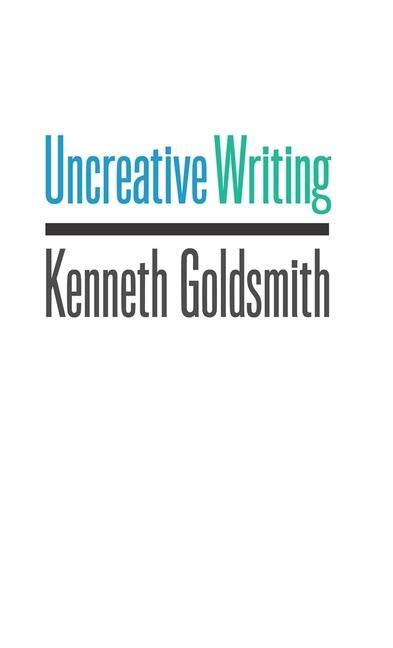
Zustellung: Do, 26.06. - Di, 01.07.
Versand in 2 Wochen
VersandkostenfreiBestellen & in Filiale abholen:
Can techniques traditionally thought to be outside the scope of literature, including word processing, databasing, identity ciphering, and intensive programming, inspire the reinvention of writing? The Internet and the digital environment present writers with new challenges and opportunities to reconceive creativity, authorship, and their relationship to language. Confronted with an unprecedented amount of texts and language, writers have the opportunity to move beyond the creation of new texts and manage, parse, appropriate, and reconstruct those that already exist.
In addition to explaining his concept of uncreative writing, which is also the name of his popular course at the University of Pennsylvania, Goldsmith reads the work of writers who have taken up this challenge. Examining a wide range of texts and techniques, including the use of Google searches to create poetry, the appropriation of courtroom testimony, and the possibility of robo-poetics, Goldsmith joins this recent work to practices that date back to the early twentieth century. Writers and artists such as Walter Benjamin, Gertrude Stein, James Joyce, and Andy Warhol embodied an ethos in which the construction or conception of a text was just as important as the resultant text itself. By extending this tradition into the digital realm, uncreative writing offers new ways of thinking about identity and the making of meaning.
In addition to explaining his concept of uncreative writing, which is also the name of his popular course at the University of Pennsylvania, Goldsmith reads the work of writers who have taken up this challenge. Examining a wide range of texts and techniques, including the use of Google searches to create poetry, the appropriation of courtroom testimony, and the possibility of robo-poetics, Goldsmith joins this recent work to practices that date back to the early twentieth century. Writers and artists such as Walter Benjamin, Gertrude Stein, James Joyce, and Andy Warhol embodied an ethos in which the construction or conception of a text was just as important as the resultant text itself. By extending this tradition into the digital realm, uncreative writing offers new ways of thinking about identity and the making of meaning.
Produktdetails
Erscheinungsdatum
20. September 2011
Sprache
englisch
Seitenanzahl
272
Autor/Autorin
Kenneth Goldsmith
Verlag/Hersteller
Produktart
kartoniert
Gewicht
306 g
Größe (L/B/H)
208/139/15 mm
ISBN
9780231149914
Pressestimmen
Brilliant and elegant insight into the exact relation of contemporary literary practices and broader cultural changes, explaining how the technologies of distributed digital media exemplified by the World Wide Web have made possible the flourishing of a particular type of literature. -- Professor Craig Dworkin, author of The Consequence of Innovation: Twenty-First-Century Poetics What Goldsmith argues has significant implications for the world of poetry, poetics, and pedagogy. His book contains brilliant moments of exegesis and archival documentation, and its keen attention to, knowledge about, and currency in artistic practice makes it as much a user's manual as a scholar's tome. -- Adalaide Morris, The University of Iowa In these witty, intelligent essays, Goldsmith brings his encyclopedic knowledge of radical artistic practice to bear on how the rise of the internet has irrevocably changed, or should irrevocably change, our existing conceptions of poetry. Goldsmith's practice as artist and critic is deeply interesting. His book is sure to generate lively debate among poets, artists, literary historians, and media theorists. -- Sianne Ngai, University of California, Los Angeles Multimedia artist and executive manager of words, Goldsmith writes a provocative manifesto for writing in the digital era, with a treasure trove of ideas, techniques, and examples that allow us to make it new -- again! -- Marcus Boon, author of In Praise of Copying "...a fascinating collection of essays..." Phi Beta Kappa 3/8/12 Goldsmith achieves a very difficult feat with this book: he writes lucidly about complex and avant-garde ideas. As a result, he opens up a vital debate for anyone who cares about literature, between notions of traditional creative writing and the set of practices he labels "uncreative writing". -- Douglas Cowie Times Higher Education 11/3/2011 Selected writers and their practices are reviewed in a series of accessible essays perfect for college-level writers. Midwest Book Review 1/1/2012 Good. -- James Franco, actor
Bewertungen
0 Bewertungen
Es wurden noch keine Bewertungen abgegeben. Schreiben Sie die erste Bewertung zu "Uncreative Writing" und helfen Sie damit anderen bei der Kaufentscheidung.









